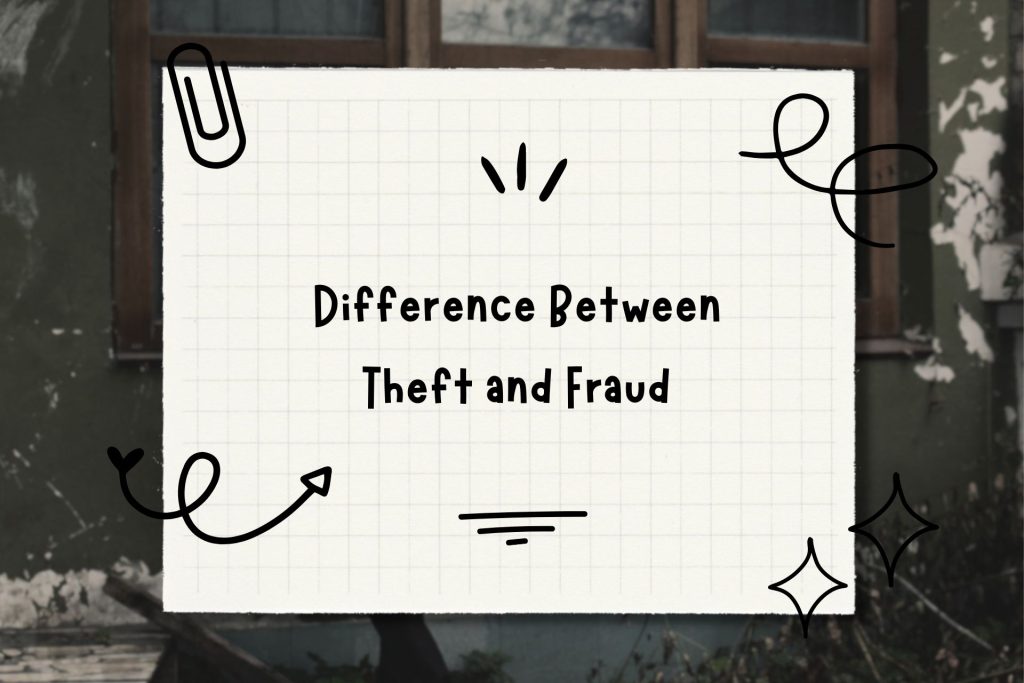The terms theft and fraud are often used interchangeably, but they hold distinct legal definitions. In essence, theft entails taking someone else’s property without consent, while fraud involves deception or misrepresentation for personal gain.
Although both involve wrongfully acquiring something, the legal and ethical implications differ significantly.
Theft constitutes the unlawful taking of someone else’s property without their permission, encompassing acts like shoplifting, burglary, and embezzlement.
The severity of the offense hinges on the value and manner of the property’s acquisition. Typically a misdemeanor, theft can escalate to a felony based on the value of the property taken or if the theft involved violence or threats.
Conversely, fraud encompasses deceit or misrepresentation for personal gain, spanning activities like identity theft, insurance fraud, and Ponzi schemes.
The crux of fraud lies in the intentional deception of the victim to obtain something valuable. Generally perceived as more serious than theft, fraud entails a higher level of premeditation and often inflicts substantial financial harm on the victim.
Defining Theft and Fraud

Theft: Legal Definition
Theft is defined as the act of taking someone else’s property without their permission or consent. It is considered a criminal offense and is punishable by law. The legal definition of theft can vary depending on the jurisdiction, but it generally involves the following elements:
- Taking: The offender must physically take or move the property from its original location.
- Property: The property must belong to someone else and have value.
- Intent: The offender must have the intent to permanently deprive the owner of the property.
- Without consent: The property must be taken without the owner’s permission or consent.
Fraud: Legal Definition
Fraud is defined as the intentional deception of another person for personal gain or to cause harm. It is also considered a criminal offense and is punishable by law. The legal definition of fraud can vary depending on the jurisdiction, but it generally involves the following elements:
- Misrepresentation: The offender must make a false statement or representation.
- Intent: The offender must have the intent to deceive the victim.
- Reliance: The victim must rely on the false statement or representation.
- Harm: The victim must suffer harm or loss as a result of the deception.
In summary, theft involves taking someone else’s property without their permission, while fraud involves intentionally deceiving another person for personal gain or to cause harm. Both are criminal offenses and can result in serious consequences for the offender.
Key Legal Distinctions
Intent and Deception
The key legal distinction between theft and fraud lies in the intent and deception involved in the commission of the crime. Theft involves the physical taking of property without the owner’s consent, while fraud involves the use of deception or misrepresentation to obtain property or services.
In theft, the perpetrator intends to permanently deprive the owner of their property. In contrast, fraud involves the use of deception or misrepresentation to obtain property or services from the victim. Fraudsters use various methods to deceive their victims, such as false promises, fake documents, or impersonation.
Property vs. Misrepresentation
Another important legal distinction between theft and fraud is the nature of the crime. Theft involves the taking of physical property, such as money, goods, or services, without the owner’s consent. Fraud, on the other hand, involves the use of misrepresentation or deception to obtain property or services.
In fraud, the perpetrator obtains property or services by misrepresenting the truth about a material fact. For example, a person may misrepresent their financial status to obtain a loan or falsely claim to be a licensed professional to provide services.
Means of Execution
The means of execution is another legal distinction between theft and fraud. Theft is typically committed through physical means, such as breaking into a house or stealing a wallet. Fraud, on the other hand, is often committed through non-physical means, such as email scams or phone calls.
Fraudsters often use technology to commit their crimes, such as phishing emails or fake websites. They may also use social engineering techniques to manipulate their victims into giving them access to their personal information or financial accounts.
To wrap it up, it’s important to recognize that while theft and fraud may seem similar, they are separate crimes with unique legal definitions and outcomes. Grasping these critical legal disparities is vital for law enforcement and individuals alike, enabling them to safeguard against falling prey to these offenses.
Consequences and Penalties
Theft Penalties
The punishment for theft varies based on the severity of the crime and the value of the stolen property. In general, petty theft of goods valued at less than $950 is considered a misdemeanor, and the offender may face up to six months in jail and/or a fine of up to $1,000. Grand theft, on the other hand, is considered a felony and carries a penalty of up to three years in prison and/or a fine of up to $10,000.
If the stolen property is a vehicle, firearm, or certain other high-value items, the punishment may be even more severe. Additionally, if the offender has a prior criminal record, they may face enhanced penalties.
Fraud Penalties
Fraud is a serious crime that can result in significant penalties. The punishment for fraud varies depending on the type and severity of the offense. In general, fraud involving smaller amounts of money or property is considered a misdemeanor and carries a penalty of up to one year in jail and/or a fine of up to $1,000.
Fraud involving larger amounts of money or property is considered a felony and can result in a sentence of up to three years in prison and/or a fine of up to $10,000. If the fraud involves a government agency or program, the penalties can be even more severe. Additionally, if the offender has a prior criminal record, they may face enhanced penalties.
It is important to note that in addition to criminal penalties, those convicted of theft or fraud may also face civil penalties, including restitution, which requires the offender to pay back the victim for any losses they suffered as a result of the crime.





